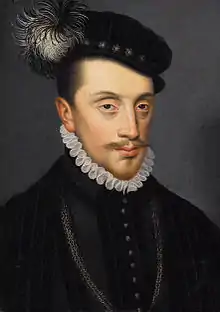Charles III, Duke of Lorraine
Charles III (18 February 1543 – 14 May 1608), known as the Great, was Duke of Lorraine from 1545 until his death.
| Charles III | |
|---|---|
| Marquis of Pont-à-Mousson | |
 Oil on panel portrait by studio of François Clouet | |
| Duke of Lorraine and Bar | |
| Reign | 12 June 1545 – 14 May 1608 |
| Predecessor | Francis I |
| Successor | Henry II |
| Born | 18 February 1543 Ducal Palace of Nancy |
| Died | 14 May 1608 (aged 65) |
| Spouse | |
| Issue | |
| House | Lorraine |
| Father | Francis I, Duke of Lorraine |
| Mother | Christina of Denmark |
| Religion | Roman Catholicism |
Life
He was the eldest surviving son of Francis I, Duke of Lorraine, and Christina of Denmark.[1]
In 1545, his father died, and his mother served as the regent during his minority. During his childhood, his aged great-grandmother, Philippa of Gelderland, died in 1547, leaving also her inheritance to the young Charles. His dynasty claimed the Kingdom of Jerusalem and used also the title of Duke of Calabria as symbol of their claims to the Kingdom of Naples. Additionally, they had a claim to the Duchy of Gelderland, inherited from Charles of Egmont, Duke of Gelderland.
In 1552, Lorraine was invaded by France, his mother's regency was terminated and Charles was removed from Lorraine to France, to be raised at the French royal court in accordance to the needs of French interests.[2] In 1559, he was married to Claude of France, and allowed to depart to Lorraine and take control of his domain.
The reign of Charles III is regarded as a great age of peace and prosperity for Lorraine. He pursued a policy of neutrality between France and The Holy Roman Empire, as well as during the French Wars of Religion. He founded the University of Pount-a-Mousson. He also expanded his realm by the incorporation of Pfalzburg from George John I, Count Palatine of Veldenz, in 1590, and tried to conquer also Lützelstein, though George John I's widow, Anna of Sweden, managed to negotiate a truce.
In 1589, he broke his policy of neutrality and allied himself with the French Catholic League because he, as a Catholic, could not accept Henry of Navarre as king of France. In his peace with Henry in 1594, he married his son to Henry's sister Catherine de Bourbon.
Family
He married Claude of Valois, princess of France, daughter of king Henry II and Catherine de' Medici.[3] They had the following children:
- Henry II, Duke of Lorraine (1563–1624)[4] married Catherine de Bourbon and Margerita Gonzaga
- Christine (1565–1637), married Ferdinando I de' Medici, Grand Duke of Tuscany
- Charles (1567–1607), Cardinal of Lorraine and Bishop of Metz (1578–1607), Bishop of Strasbourg (1604–1607)[4]
- Antoinette (1568–1610), married John William, Duke of Jülich-Cleves-Berg.
- Anne (1569–1576)
- Francis II, Duke of Lorraine (1572–1632)[4] married Christina of Salm
- Catherine (1573 † 1648), Abess de Remiremont
- Elisabeth Renata (1574–1635), married Maximilian I, Elector of Bavaria
- Claude, 1575–1576.
 Charles and his wife Claude
Charles and his wife Claude
Ancestors
| Charles III, Duke of Lorraine | Father: Francis I, Duke of Lorraine |
Paternal Grandfather: Antoine, Duke of Lorraine |
Paternal Great-grandfather: René II, Duke of Lorraine |
| Paternal Great-grandmother: Philippa of Guelders | |||
| Paternal Grandmother: Renée of Bourbon-Montpensier |
Paternal Great-grandfather: Gilbert, Count of Montpensier | ||
| Paternal Great-grandmother: Clara Gonzaga | |||
| Mother: Christina of Denmark |
Maternal Grandfather: Christian II of Denmark |
Maternal Great-grandfather: John of Denmark | |
| Maternal Great-grandmother: Christina of Saxony | |||
| Maternal Grandmother: Isabella of Austria |
Maternal Great-grandfather: Philip I of Castile | ||
| Maternal Great-grandmother: Joanna of Castile |
See also
References
- Bogdan 2005, p. 119-120.
- Bogdan 2005, p. 123-124.
- von Friedeburg & Morrill 2017, p. 121.
- Bogdan 2005, p. 286.
Sources
- von Friedeburg, Robert; Morrill, John, eds. (2017). Monarchy Transformed: Princes and their Elites in Early Modern Western Europe. Cambridge University Press.
- Bogdan, Henry (2005). La Lorraine des ducs (in French). Perrin.